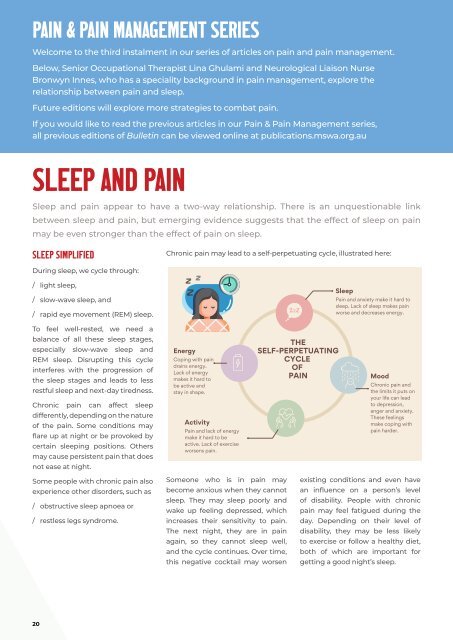MSWA Bulletin Magazine Summer 2022
Keeping your cool this summer | Welcome Melanie Kiely CEO | MSWA Stationary Cycle results | Pain and pain management series: Part 3
Keeping your cool this summer | Welcome Melanie Kiely CEO | MSWA Stationary Cycle results | Pain and pain management series: Part 3
You also want an ePaper? Increase the reach of your titles
YUMPU automatically turns print PDFs into web optimized ePapers that Google loves.
PAIN & PAIN MANAGEMENT SERIES<br />
Welcome to the third instalment in our series of articles on pain and pain management.<br />
Below, Senior Occupational Therapist Lina Ghulami and Neurological Liaison Nurse<br />
Bronwyn Innes, who has a speciality background in pain management, explore the<br />
relationship between pain and sleep.<br />
Future editions will explore more strategies to combat pain.<br />
If you would like to read the previous articles in our Pain & Pain Management series,<br />
all previous editions of <strong>Bulletin</strong> can be viewed online at publications.mswa.org.au<br />
SLEEP AND PAIN<br />
Sleep and pain appear to have a two-way relationship. There is an unquestionable link<br />
between sleep and pain, but emerging evidence suggests that the effect of sleep on pain<br />
may be even stronger than the effect of pain on sleep.<br />
SLEEP SIMPLIFIED<br />
Chronic pain may lead to a self-perpetuating cycle, illustrated here:<br />
During sleep, we cycle through:<br />
/ light sleep,<br />
/ slow-wave sleep, and<br />
/ rapid eye movement (REM) sleep.<br />
Sleep<br />
Pain and anxiety make it hard to<br />
sleep. Lack of sleep makes pain<br />
worse and decreases energy.<br />
To feel well-rested, we need a<br />
balance of all these sleep stages,<br />
especially slow-wave sleep and<br />
REM sleep. Disrupting this cycle<br />
interferes with the progression of<br />
the sleep stages and leads to less<br />
restful sleep and next-day tiredness.<br />
Chronic pain can affect sleep<br />
differently, depending on the nature<br />
of the pain. Some conditions may<br />
flare up at night or be provoked by<br />
certain sleeping positions. Others<br />
may cause persistent pain that does<br />
Energy<br />
Coping with pain<br />
drains energy.<br />
Lack of energy<br />
makes it hard to<br />
be active and<br />
stay in shape.<br />
Activity<br />
Pain and lack of energy<br />
make it hard to be<br />
active. Lack of exercise<br />
worsens pain.<br />
THE<br />
SELF-PERPETUATING<br />
CYCLE<br />
OF<br />
PAIN<br />
Mood<br />
Chronic pain and<br />
the limits it puts on<br />
your life can lead<br />
to depression,<br />
anger and anxiety.<br />
These feelings<br />
make coping with<br />
pain harder.<br />
not ease at night.<br />
Some people with chronic pain also<br />
experience other disorders, such as<br />
/ obstructive sleep apnoea or<br />
/ restless legs syndrome.<br />
Someone who is in pain may<br />
become anxious when they cannot<br />
sleep. They may sleep poorly and<br />
wake up feeling depressed, which<br />
increases their sensitivity to pain.<br />
The next night, they are in pain<br />
again, so they cannot sleep well,<br />
and the cycle continues. Over time,<br />
this negative cocktail may worsen<br />
existing conditions and even have<br />
an influence on a person’s level<br />
of disability. People with chronic<br />
pain may feel fatigued during the<br />
day. Depending on their level of<br />
disability, they may be less likely<br />
to exercise or follow a healthy diet,<br />
both of which are important for<br />
getting a good night’s sleep.<br />
20

















